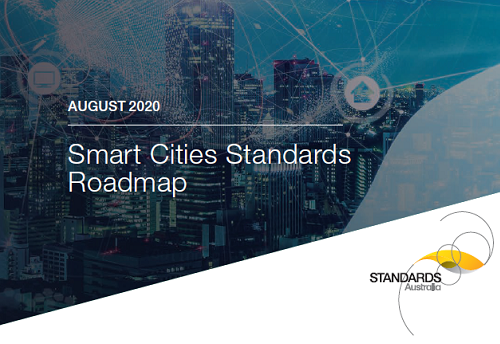REPORTS
Smart Cities Standards Roadmap
Executive Summary
The Smart Cities Standards Roadmap (Roadmap) was prepared in consultation with Standards Australia’s Smart Cities Reference Group (Reference Group). It is designed to highlight critical issues that will support the growth of Smart Cities and progress the recommendations of the report Building Up and Moving Out and other related priorities for Australia.
The Roadmap provides a summary of recommendations and insights by aggregating the views of Australian stakeholders who participated in the Reference Group discussions. It provides a collective Australian viewpoint on the matters of priority and actions that can be undertaken by Australia to develop Smart Cities standards, and foresight for Australia’s leadership in the development of international and national Smart Cities standards.
During the Roadmap development, a decision was made to commence the implementation of these recommendations, concurrent with finalising the Roadmap. This was to ensure that access to foundational standards was available to support local government and Smart Cities stakeholders develop their Smart Cities vision and initiatives. Through 2019 and 2020, the Reference Group endorsed the adoption and publication of a total of seven Smart Cities foundational standards (namely the ISO/ IEC 37100 series), including:
- ISO/IEC 37106 – a Smart City operating model
- ISO/IEC 37100 – a vocabulary of terms and definitions referenced in Smart Cities standard documents
- ISO/IEC 37120, 37122, 37123 – a set of indicators to measure a city’s performance in meeting their goals
- ISO/IEC 37101, 37104 – a management system and practical guidance
The Reference Group also recognised the challenges associated with a complex and growing international Smart Cities standards work program, so with this in mind, the Reference Group reviewed and agreed to refine the future Smart Cities committee structure. The result of this review was incorporated into the recommendations, these were:
- the establishment of the Smart Cities Advisory Group (SCAG)
- the dissolution of the Smart Cities Standards Reference Group (Reference Group), and
- the creation of two new dedicated Australian technical committees to mirror the work program of international committees ( ISO/TC 268 and IEC Syc Smart Cities).
The new committee structure will enable Smart Cities stakeholders to continue to play a role in Smart Cities standards development. The Reference Group also saw value in separating the strategic function of the committee (through the SCAG) and the technical function, through the creation of two new dedicated Australian technical committees. By creating these new committees, stakeholders will be able to contribute to standards discussions aligned with their respective areas of expertise.
The Roadmap demonstrates that Australian stakeholders recognised that as a country, we have had limited input to the global Smart Cities standards discussion. The challenge is to ensure we collectively reach the same level of maturity and understanding of how standards can play a role in supporting our Smart Cities vision. Internationally, our contributions are valued, and there are opportunities for Australia to help shape new and developing areas of Smart Cities related standards.
Finally, Standards Australia would like to acknowledge the members of the Smart Cities Standards Reference Group, chaired by the NSW Chief Data Scientist, Dr Ian Oppermann, for their contribution and expertise in the development of the Roadmap.
SHARE:






